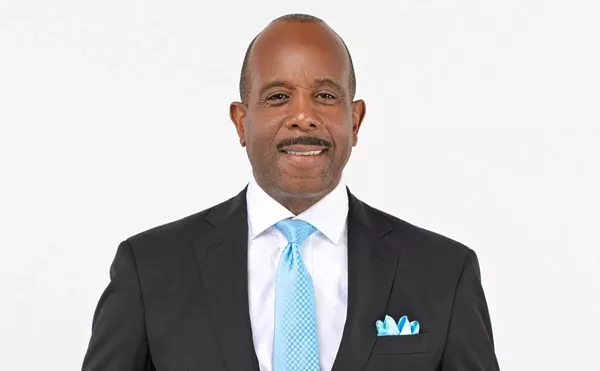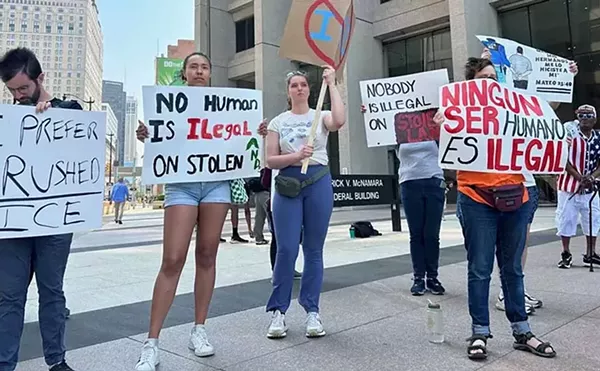
Audio By Carbonatix
[
{
"name": "GPT - Leaderboard - Inline - Content",
"component": "35519556",
"insertPoint": "5th",
"startingPoint": "3",
"requiredCountToDisplay": "3",
"maxInsertions": 100,
"adList": [
{
"adPreset": "LeaderboardInline"
}
]
}
]
What happens when the political fringe and the mainstream of public opinion begin to merge? The answer to that question is "nothing," at least as long as the mainstream remains unaware of the message those on the margins are attempting to deliver.
It's an issue playing out this election season as the far-lefties in Michigan's Green Party push a platform that has as its foundation an unequivocal message: End the war in Iraq and use the money currently being sent there to rebuild this state and country.
With the Republicans following their leader into a "stay the course" quagmire and Democrats failing to unify behind any coherent plan, the Green Party and its candidates have made clear their goal is to bring the U.S. troops home now.
It's a position held by a plurality of Americans. A Gallup survey taken last month found that 37 percent of those polled think our troops should be removed from Iraq immediately. Another 26 percent support a gradual withdrawal. Only 30 percent of the respondents said we should stay the course.
In Michigan, according to poll results reported in the Detroit Free Press on Oct. 15, 60 percent of the likely voters surveyed said they oppose the war. However, despite their opposition, 45 percent of the same Michiganders polled say the United States should stay in Iraq until the government there establishes firm control; 40 percent said we should leave even if that means increased violence is the result.
Particularly telling was the poll's finding that 30 percent of those opposed to the war supported it initially, indicating just how far public opinion has shifted.
On the same day that the Freep poll was released, Green Party Senate candidate David Sole found himself literally locked out of a debate between incumbent Sen. Debbie Stabenow and Republican challenger Mike Bouchard. Sole raised a ruckus about being excluded from the debate at Grand Rapids public television station WGVU, and the police were summoned. (A few days later security guards would usher him from a similarly exclusive debate sponsored by the Detroit Economic Club at the Renaissance Center.)
Sole calculates that Michigan's contribution to the more than $300 billion spent fighting in Iraq has been about $8.7 billion. That's money that should have gone toward educating our children, providing universal health care and rebuilding crumbling infrastructure, says Sole, an analytic chemist at Detroit's wastewater treatment plant, union local president and a longtime progressive activist.
Talking to a gathering of Greens at a house party in Detroit's English Village neighborhood afterward, Sole joked that he made it out of Grand Rapids "one step ahead of the sheriff." Sole said he didn't fear getting arrested, but he didn't much savor the idea of having to truck all the way back to Grand Rapids to deal with the court appearances getting nabbed would lead to.
It's a frustrating situation, being a candidate with a position that resonates with an increasing number of voters, yet finding yourself hamstrung when attempting to get that message out. Exclusion from the recent debates was no anomaly; Republicans and Democrats have consistently worked to keep third parties like the Greens from participating in such events. And mainstream media plays along, providing at best skeletal coverage of any candidate outside the two major parties. An article about the Grand Rapids debate in the Free Press, for example, included exactly one sentence — at the very end of the story — about the lockout of Sole.
Such coverage — or, more accurately, the lack of it — creates a sort of self-fulfilling prophecy. Under the rationale that they have no chance of success on Election Day, candidates from fringe parties are denied the media spotlight provided Republicans and Democrats; but the continued dearth of coverage only assures that they remain on the margins.
This is about much more than the environmental issues long championed by Greens. Staunchly pro-union, in favor of a national health care system, opposed to NAFTA and similar types of "free trade" measures, immigrant-friendly, decidedly pacifist, pro-affirmative action and supportive of a pro-choice feminist agenda, the Greens see forces at work that they believe will inevitably push voters into their camp. Michigan, with its high unemployment, failing economy, soaring foreclosure rates and yet more auto-industry cutbacks looming, could be at the vanguard of the movement they hope to see swell. The worse things get for the poor and an increasingly beleaguered middle-class, the more likely voters will be open to options outside the traditional two-party system.
The English Village gathering attended by Sole, who once ran for Congress as a candidate for the socialist Workers World Party, was held at the home of Fred Vitale, who's running to represent the 3rd District in the state House, and his wife, Margaret Guttshall, a candidate for the Wayne State University Board of Governors. There were a handful of other candidates among the roughly 30 people who showed up to nosh on stuffed grape leaves and hummus and to listen to calls for support from those running for office.
There's virtually no chance any of them will win on Nov. 7.
But there is hope that this election could "become a large demonstration against the war," says Sole. Moreover, the campaign he and fellow Greens are waging is part of what they see as "movement-building, getting out there and networking and building a coalition."
The way Sole and others gathered here see it, electoral success doesn't fuel mass movements, it follows them. The Vietnam War, and the years of protests that preceded the government's eventual decision to pull out, is a prime example. As for proof that a third party can quickly become a force in American politics, the Greens look even further back in history, to 1854, when abolitionists opposed to slavery met in Jackson, Mich., to form the Republican Party. Within six years, the GOP took control of the White House when Abraham Lincoln won the presidency.
The criticism leveled at the Greens is that they're spoilers, siphoning votes from Democrats and handing elections to the GOP. Exhibit A is the 2000 presidential election in Florida, which, say critics, Al Gore would have won beyond dispute had it not been for the strong showing by Green candidate Ralph Nader.
Greens respond by saying that a) Many Nader supporters were people who would not have voted at all because they were fed up with the two major parties, b) Gore would have won had he run a more progressive campaign and c) Gore should have done more to contest the disputed outcome.
That may be, but it's hard to deny the effect that election had on Green Party support. In that 2000 election, Nader received more than 84,000 votes in Michigan, or about 2 percent of the vote. Four years later, Nader pulled just more than 24,000 votes, less than one-half of 1 percent.
The criticism Greens have of the Democratic Party is that it has sold out its traditional constituency, accepting the same corporate cash that has long fueled the GOP and is moving so far to the middle that its platform is indistinguishable from that of moderate conservatives.
David Bonior, a former Democratic congressman from Macomb County who now teaches labor relations at Wayne State University and chairs the union nonprofit group American Rights at Work, says he sees some validity in that criticism.
He points to the Patriot Act, which was supported by nearly every Democrat in the Senate, as an example. "And a large number of Democrats voted for this war as well," he says.
"It's a pretty sad, sorry record, " he says, adding that if Democrats don't step to the fore on these and other key issues such as climate change and human rights, they run the risk of being seen as indistinguishable from the Republicans. What that means specifically as the Dems seem poised to take the House for the first time in years remains to be seen.
As far as the Greens are concerned, that point has already been passed. Sole points to the fact that Stabenow voted for the recently passed "torture bill" pushed by the Bush administration, and, although initially voting against authorizing the Iraq war, voted five times to continue funding it.
"We don't need a third party," says Sole. "What we need is a second party."
Curt Guyette is Metro Times news editor. Contact him at 313-202-8004 or cguyette@metrotimes.com




